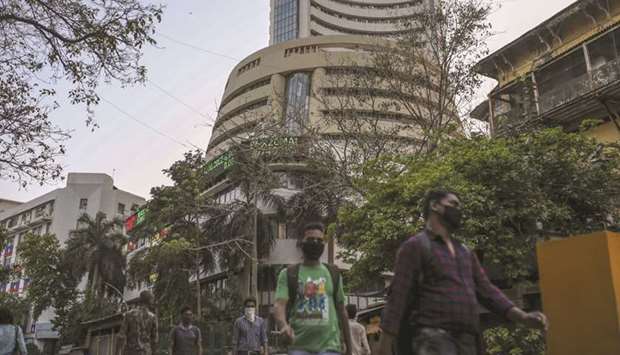India’s stocks declined for the seventh week, and ahead of an extended weekend, after comments yesterday morning by Prime Minister Narendra Modi failed to offer any concrete measures to curb the spread of the coronavirus pandemic in the nation.
The S&P BSE Sensex Index slid 2.4% to close at 27,590.95 points yesterday and capped seven straight weeks of declines, last seen in 2008. The NSE Nifty 50 Index dropped by 2.1% yesterday after Modi used a video message to the nation to ask citizens to light candles to “challenge the darkness” of the crisis and practice social distancing. India markets are closed on Monday for another holiday.
“It’s too dynamic right now for traders ahead of the long weekend,” said Dharmesh Kant, head of retail research at Indianivesh Securities Ltd. “There is a constant push and pull between signs of containment of the virus and discounting its impact on the economy.”
The nation continues to grapple with a three-week lockdown and a spike in confirmed cases. The Reserve Bank of India announced 11 days of shortened trading time for bonds and foreign exchange effective from April 7. The thinning out of activity is impacting market liquidity and increasing volatility of financial prices, the central bank said in a statement.
“Such a move would be indicative of further hardships and continuity of lockdown,” Kant said.
The yield on benchmark 10-year sovereign bonds rose 14 basis points to 6.28%. The rupee declined 0.7% to 76.0650 per dollar. Trading volume in India’s financial markets has thinned as thousands of traders and brokers work from home, and after banks curtailed operations during the second week of the lockdown.
Foreigners pulled about $15bn from the country’s stocks and bonds in March, the most in emerging Asia, according to data compiled by Bloomberg, as the Sensex capped its worst quarter ever.
The government has already taken several steps to prop up an economy set to grow at its slowest pace in more than a decade. It has rolled out a $22.6bn spending plan and said it will sell about $64.5bn of bonds in the six months to September. Meanwhile, the central bank has delivered an emergency interest-rate cut and lifted restrictions on purchases of some government bonds by foreign investors.
India has confirmed 72 deaths and nearly 2,600 cases linked to the coronavirus, as thousands of health officials across the world’s second-most populous country are racing to identify people connected to at least 10 virus hotspots. Thirteen of the 19 sector sub-indexes compiled by BSE Ltd slid, led by a gauge of bank shares. Axis Bank Ltd sank the most among Sensex companies and ICICI Bank Ltd was the biggest drag on the gauge.
Meanwhile the Indian rupee fell against the US dollar yesterday, dragged down by selling pressure in domestic equity markets. Domestic bond yields also spiked after the government announced aggressive borrowing plan for the first half of this year. The rupee fell to 76.37 at day’s low before closing at 76.19 after opening weaker at 76.05 per US dollar. The rupee had settled at 75.60 against the US dollar on Tuesday. Forex markets in India were closed on April 1 for the annual closing of banks and on April 2 on account of Ram Navami.
Domestic stock market index Sensex fell nearly 700 points weighed down by selling pressure from foreign investors, who moved out record money out of Indian markets in March.
Investors are shifting to safe havens like dollar and gold from risky asset classes, says Shrikant Chouhan of Kotak Securities. Gold futures on MCX yesterday surged nearly 1.5% to about Rs44,000 per 10 gram.
“Rupee traded weak on expected lines with strong uncertainty ahead for global as well as domestic markets the currency keeps devaluing as it keeps pricing in the money outflows from FIIs,” said Jateen Trivedi, Senior Research Analyst (Commodity & Currency) at LKP Securities.
The US dollar was also broadly higher against other currencies with the dollar index edging higher to 100.20. The dollar index measures the greenback’s strength against a basket of six currencies.
Analysts say that the Indian rupee is likely to remain under pressure along with other emerging market currencies until the coronavirus pandemic subsides. The total cases in India jumped above 2,300, according to the latest figures.
The rupee’s path will largely depend on how successful the Indian government’s steps are in containing the spread of Covid-19 in a country of more than 1.3bn people, the second-most-populous in the world, according to analysts polled by Reuters. The rupee is down over 6% since the start of the year, hitting a record low of about 76.40 last month.
Analysts say that the Reserve Bank may step in to prevent a sharp fall further in the rupee. The central bank last month cut interest rate by 75 basis points and announced targeted long-term refinancing operations to ensure market liquidity.

Pedestrians wearing protective masks walk past the Bombay Stock Exchange building in Mumbai. The Sensex slid 2.4% to close at 27,590.95 points yesterday and capped seven straight weeks of declines, last seen in 2008.
